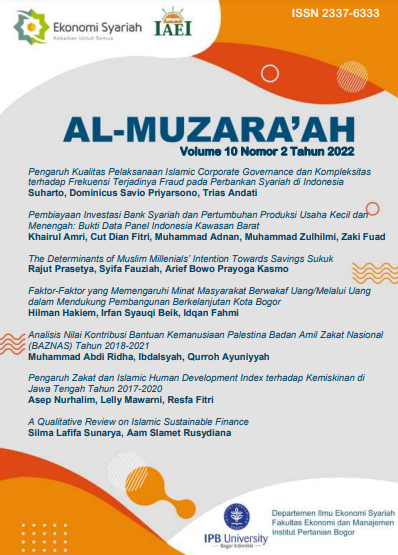Pengaruh Kualitas Pelaksanaan Islamic Corporate Governance dan Kompleksitas terhadap Frekuensi Terjadinya Fraud pada Perbankan Syariah di Indonesia
Main Article Content
Abstract
This study is explore the quality of ICG in sharia banking in Indonesia during the period of 2011 – 2020, analyze the effect of the quality of ICG implementation and complexity on the frequency of fraud in sharia banking in Indonesia. This study uses a descriptive method with a quantitative approach. The data analysis method used panel data regression. The results that the quality of ICG implementation at BUS during 2011-2020 on average was in the predicate of “very good”, “good” and “good enough”. The implementation of ICG in BUS BUKU III is better than BUS BUKU II and BUKU I. The results also show that the quality of ICG implementation has a significant effect on fraud, if the ICG value increases (the quality of ICG implementation decreases) by 1 unit, then fraud will increase by 1.3251 unit. Then, the complexity has no effect on the frequency of fraud, meaning that the complexity of banks reflected in the category of BUKU 1 banks has the same level of fraud as BUKU II and III.
Downloads
Article Details

This work is licensed under a Creative Commons Attribution-ShareAlike 4.0 International License.
Author(s) who published in this journal agree to following terms:
- Authors understand and agree that copyright of manuscripts published are held by Al-Muzara'ah. The statement to release the copyright to Al-Muzara'ah is stated in form CTA (link doc).
- Copyright encompass exclusive rights to reproduce, to distribute, and to sell any part of the journal articles in all form and media.
This work is licensed under a Creative Commons Attribution-ShareAlike 4.0 International License (CC BY-SA) where Authors and Readers can copy and redistribute the material in any medium or format, as well as remix, transform, and build upon the material for any purpose, but they must give appropriate credit (cite to the article or content), provide a link to the license, and indicate if changes were made. If you remix, transform, or build upon the material, you must distribute your contributions under the same license as the original.
References
Astuti, M. A., Rozali, R. D. Y. & Cakhyaneu, A. (2019). Prevention of fraud in sharia banking in Indonesia through implementation of sharia corporate governance. KnE Social Sciences, 183-202.
Barus, Y. P. P., Chung, J. & Umar, H. (2021). Pengaruh fraud triangle terhadap kecurangan laporan keuangan dengan ukuran perusahaan sebagai pemoderasi pada perusahaan perbankan yang terdaftar di Bursa Efek Indonesia Tahun 2017 – 2019. Kocenin Serial Konferensi, 1(4), 311-321.
Besari, B. (2009). Pengaruh Kualitas Pelaksanaan Good Corporate Governance, Ukuran (Size) dan Kompleksitas Bank terhadap Fraud (Kasus Pada Bank Umum Tahun 2007). (Tesis, Universitas Diponegoro, Semarang, Indonesia).
Chaoul, L. F. (2016). Effects of Corporate Governance and Fraud Prevention: The Case of Lebanon. (Thesis, Lebanese American University, Beirut, Lebanon).
Fama, E. F. & Jensen, M. C. (1983). Agency problems and residual claims. The Journal of Law and Economics, 26(2), 327-349.
Handoko, B. L. & Ramadhani, K. A. (2017). Pengaruh karakteristik komite audit, keahlian keuangan dan ukuran perusahaan terhadap kemungkinan kecurangan laporan keuangan. DeReMa (Development Research of Management): Jurnal Manajemen, 12(1), 86-113.
In’airat, M. (2015). The role of corporate governance in fraud reduction - a perception study in the Saudi Arabia business environment. Journal of Accounting and Finance, 15(2),119-128.
Indriastuti, M & Ifada, L. M. (2011). Pengaruh kualitas pelaksanaan corporate governance dan kompleksitas bank terhadap fraud. Jurnal Ekonomi Bisnis (EKOBIS), 12(2), 168-176.
Jensen, M. C. & Meckling, W. H. (1976). Theory of the firm: Managerial behavior, agency cost and ownership structure. Journal of Financial Economics, 3(4), 305-360.
Nadia, F. A., Sukarmanto, E. & Purnamasari, P. (2018). Pengaruh pengendalian internal dan good corporate governance terhadap pencegahan kecurangan. Prosiding Akuntansi, 4(2), 861-868.
Najib, H. & Rini, R. (2016). Sharia compliance, islamic corporate governance dan fraud pada bank syariah. Jurnal Akuntansi dan Keuangan Islam, 4(2), 131-146.
Oktiawati, H. (2020). Pengaruh Islamic Corporate Governance (ICG) dan Profitabilitas terhadap Kepatuhan Wajib Pajak Badan pada Perbankan Syariah di Indonesia. (Tesis, UIN Raden Intan Lampung, Bandar Lampung, Indonesia).
Rahmayani, R. & Rahmawaty, R. (2017). Pengaruh islamic corporate governance dan internal control terhadap indikasi terjadinya fraud pada bank umum syariah di Indonesia. Jurnal Ilmiah Mahasiswa Ekonomi Akuntansi (JIMEKA), 2(3), 18-38.
Sadique, R. B. M. (2016). Corporate Fraud: An Empirical Analysis of Corporate Governance and Earnings Manajemen in Malaysia. (Thesis, Lincoln University, Lincoln, New Zealand).
Saputra, A. (2017). Pengaruh sistem internal, kontrol, audit internal, dan penerapan good corporate governance terhadap kecurangan (fraud) perbankan (studi kasus pada bank syariah anak perusahaan BUMN di Medan). Riset dan Jurnal Akuntansi, 1(1), 48-55.
Strawhacker, J. C. (2016). Analysis of Factors Influencing Corporate Ethnics and Anti- Fraud Program. (Thesis, Utica College, New York, USA).
Wahyuningtias F. (2016). Analisis Elemen-Elemen Fraud Diamond sebagai Determinan Finansial Statement Fraud pada Perusahaan Perbankan di Indonesia. (Tesis, Universitas Airlangga, Surabaya, Indonesia).
Wati, C. & Puspitasari, W. (2019). Pengaruh fraud diamond, corporate governance, dan kompleksitas bank terhadap financial statement fraud pada perusahaan perbankan. Jurnal Akuntansi Trisakti, 4(2), 157.
Xu, X. & Wang, Y. (1997). Ownership Structure, Corporate Governance and Firm’s Performance: The Case of Chinese Stock Companies. (Thesis, Amherst College, Massachusetts, USA).

